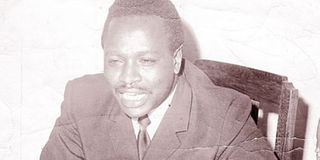Premium
Documents on JM Kariuki’s secret tour of Ghana to fix Oginga Odinga

JM Kariuki, former MP for Nyandarua North constituency. FILE PHOTO |
What you need to know:
- It was not clear if JM was acting alone or in concert with Tom Mboya, Jaramogi’s political rival, when he embarked on the Ghana trip.
- In the letter, the respected Ghanaian leader strongly criticised Jaramogi for acting contrary to the interests of African unity.
- Judging from Jaramogi’s response to Nkrumah’s letter, it might have been something to do with internal rivalry that characterised Kanu before independence.
In early June 1962, JM Kariuki, then serving as political secretary to the newly appointed minister of State Mzee Jomo Kenyatta, embarked on a secret mission to Ghana.
Correspondences intercepted by the Directorate of Intelligence and Security of the Kenya Colony, and which have recently been made accessible at the British National Archives in London, show that the visit was to drive a wedge between Ghana’s President Kwame Nkrumah and Kenya’s independence politician Jaramogi Oginga Odinga.
Apparently, JM had mentioned his mission to Mzee Kenyatta, who refused to get involved.
It was not clear if JM was acting alone or in concert with Tom Mboya, Jaramogi’s political rival, when he embarked on the Ghana trip.
GOOD TERMS
At the time, Jaramogi was in good terms with Nkrumah and had even been offered a £2,800 German-made printing press for Kanu to be installed in Kisumu.
But Nkrumah and his erstwhile protégé Mboya – whom he had helped win the chairmanship of the All Africa People’s Conference held in Accra in 1958 – was already strained over differences on trade union organisations.
Back to the JM trip.
He returned to Kenya on June 19 with a letter addressed to Jaramogi by Nkrumah, according to the secret British files accessed by the Nation.
In the letter, the respected Ghanaian leader strongly criticised Jaramogi for acting contrary to the interests of African unity.
What JM told Nkrumah still remains a mystery, but judging from Jaramogi’s response to Nkrumah’s letter, it might have been something to do with internal rivalry that characterised Kanu before independence.
DRAFT REPLY
Upon receiving the letter, Jaramogi instructed his private secretary, BFF Oluande K’Oduol, to draft a reply, which read:
“My Dear Nkrumah,
Your letter of the 18th June 1962 has taken me by surprise.
I urge upon you not to believe the imperialist lies which have been passed on to you. It is absolutely not true that I am fighting for power and that I am not playing my part in putting Jomo Kenyatta in his rightful place of leadership.
We have proven facts that Mboya is an Anglo-American agent working within Kanu to uphold western dominance in our party and country.
He is constantly supplied with colossal sums of money to subvert our party to remove Jomo Kenyatta and myself from the leadership of our party and people.
What I have done has been to expose him to the people as an Anglo-American agent working for the downfall of Jomo Kenyatta, myself and other genuine nationalists and our replacement by himself and other imperialist stooges.
MBOYA AGAINST GHANA
Under Jomo Kenyatta’s leadership we have evidence both from Government and Kenya Federation of Labour documents to substantiate my statements.
You are yourself aware that Mboya has been working against Ghana and especially your trade unions. We have made arrangements to ensure that Jomo Kenyatta is adequately advised and assisted in his work as our leader.
Do not believe stories that I am not assisting.
Our only handicap is that we do not have the funds that Mboya has.
I am going to Moscow to attend the world congress between 7-19 July 1962, if it can be possible for us to meet on my way back to Kenya, then please instruct your ambassador in Moscow to contact me for detailed arrangements.
I assure you that your fraternal advice is ever cherished and arrangements will be made to supply you with correct information from time to time.
Yours ...
“Jaramogi” Ajuma Oginga Odinga.”
STOP OVER
It is difficult to ascertain whether Nkrumah agreed to meet Jaramogi as he never made a stopover in Ghana on his way from Moscow. Instead, he made a stopover in Cairo before proceeding to Nairobi.
JM’s mission certainly did little to discredit Jaramogi in the eyes of Nkrumah, but even if it did, it appears the two Pan-Africanists ironed out issues later.
When Jaramogi wrote his autobiography, Not Yet Uhuru, it was Nkrumah who wrote the foreword dated June 14, 1966, in which he described Jaramogi as a “friend and a fellow freedom fighter”.
Ironically, the two were no longer in power and blamed America’s Central Intelligence Agency for their woes.
Jaramogi had resigned as the vice president in April 1966 and was a leading opposition figure through his Kenya People’s Union, while Nkrumah was living in exile in Conakry, Guinea, as an honorary co-president of Guinea after he was deposed in a February 1966 military coup.





